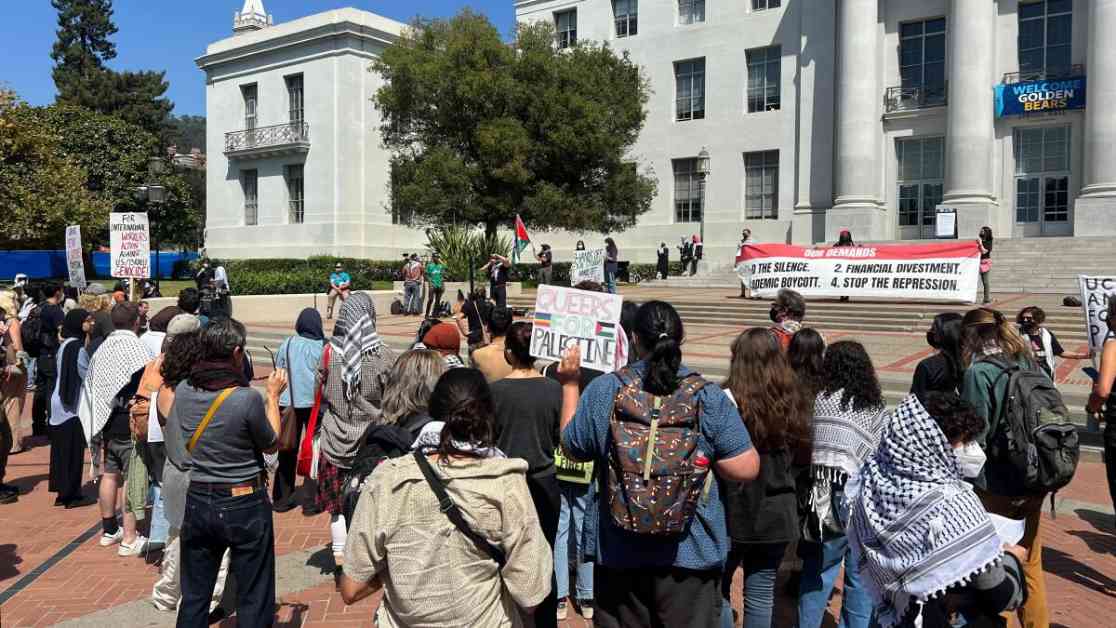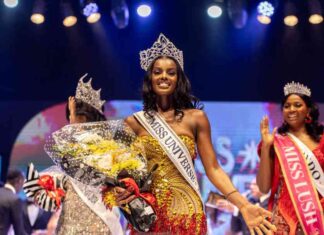BERKELEY, Calif. — As students across several Bay Area universities kicked off the fall semester with coordinated pro-Palestinian rallies, the focus shifted to the zero-tolerance regulations that the University of California and California State University systems have vowed to strictly enforce this school year. These regulations aim to prevent the disruptive tactics that roiled campuses for much of the previous spring semester.
At UC Berkeley, approximately 200 students gathered at Sproul Plaza, a central gathering spot that was previously the site of a sprawling encampment during the spring semester, with more than 180 tents at its peak. Despite the zero-tolerance rules banning encampments and the blocking of walkways, the protesters made it clear that they intend to keep their opposition to the war in Gaza and concerns about the plight of Palestinians at the forefront of their activism in the new school year.
During the rally, demonstrators waved Palestinian flags and chanted accusations of apartheid against Israel. Featured speakers spoke out against the violence in Gaza and criticized President Biden and Vice President Kamala Harris for not cutting off military aid to Israel. While most students passing through Sproul Plaza paused only briefly to observe the protest before continuing on to class, the rally continued for 90 minutes, with the protesters making their voices heard.
A similar rally took place at San Francisco State University, where approximately 100 students gathered at Malcolm X Plaza. They were joined by pro-Palestinian students from UC Santa Barbara, UC Santa Cruz, and other Bay Area campuses. The speakers at these rallies emphasized the need to come back stronger than the previous year and expressed their commitment to continuing their advocacy for the Palestinian cause.
The reignited protests signal the continued resolve of many students to take a stance against the war in Gaza, despite the potential for disciplinary action under the stricter enforcement of policies banning behaviors that led to campus division, lawsuits, and violence in the past school year. Both UC President Michael V. Drake and CSU Chancellor Mildred A. García have directed campus leaders to strictly enforce rules against encampments, blocking access to buildings and walkways, and masking to conceal one’s identity while engaging in wrongdoing.
UC Berkeley’s new chancellor, Rich Lyons, emphasized the university’s commitment to free speech rights while also ensuring that rules are followed. He stated, “There are hundreds of places on the Berkeley campus for students to express their free speech rights. We are a free speech university. But to intentionally break the rules… now you’re in the world of civil disobedience, and we’re going to think about consequences.”
The demonstrations at UC Berkeley and San Francisco State stayed within the established parameters, with protesters expressing their willingness to risk disciplinary action to continue speaking out against what they view as an international humanitarian crisis. Yousuf Abubakr, a UC Berkeley graduate student in mechanical engineering, shared that heart-rending images of the suffering of Palestinian civilians prompted him to join the movement. He emphasized the group’s determination to see the liberation of Palestine and create change through education and activism.
While encampments were viewed as a negotiating tool by some protesters, organizers indicated that they would explore other tactics as they evaluate effectiveness and safety. The previous school year saw the largest student activist movement since the Vietnam War, with pro-Palestinian supporters establishing tent cities on multiple California campuses and engaging in various forms of protest against Israel’s military actions in Gaza.
In response to the protests, UC leaders rejected a key demand for divestment from companies doing business with Israel. At UC Berkeley, demonstrators removed tents at the end of the spring semester after reaching an agreement with then-Chancellor Carol Christ. While Berkeley opted not to target Israel through divestment or academic boycotts, they committed to reviewing complaints about discrimination against Palestinians and other groups in academic partnerships.
Similarly, CSU leaders stated that they have no plans to target Israel for divestment. However, San Francisco State President Lynn Mahoney agreed to host talks regarding changing the investments of the SF State Foundation, resulting in a decision to remove investments in companies deriving revenue from weapons manufacturing. This move was seen as a positive outcome of student activism, setting a precedent for other institutions to follow.
The demonstrations at UC Berkeley and San Francisco State serve as a testament to the ongoing commitment of students to advocate for the Palestinian cause and address what they perceive as an urgent humanitarian crisis. Despite the challenges posed by stricter regulations and the potential for disciplinary action, these students remain steadfast in their resolve to bring about change and raise awareness of the issues affecting Palestinians.



























